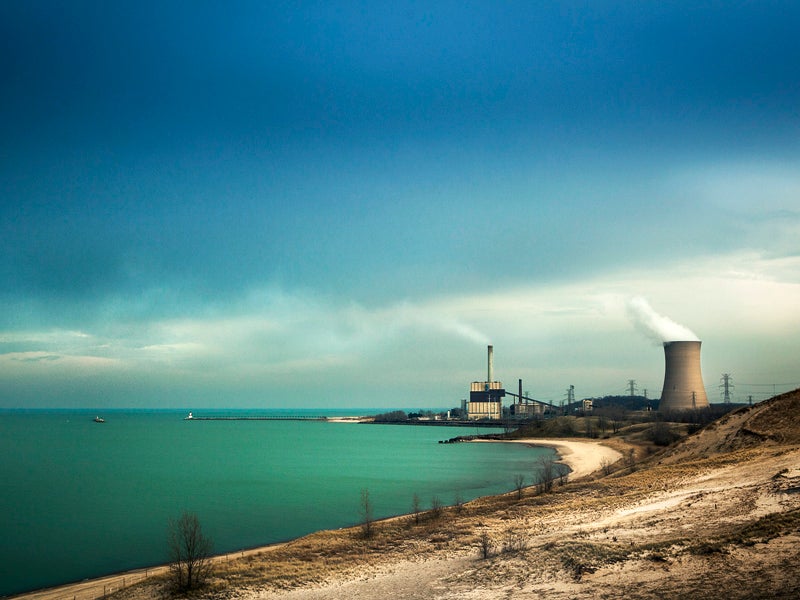Dumping Toxic Coal Ash Threatens the Great Lakes
Irresponsible and unregulated coal ash dumping is robbing current and future generations of their main source of fresh water and their ability to enjoy the outdoors, while also causing devastating health effects.

This page was published 9 years ago. Find the latest on Earthjustice’s work.
Imagine running through endless rows of luscious trees that tower over you, while being enveloped by the sweet aroma of freshly ripened apples. Envision yourself walking your dog down a nature trail and being entranced by the transformation of green leaves to bright yellow, orange and red. See yourself walking through a calm, undisturbed forest, while the snowflakes slowly dance down all around you. Then, visualize yourself spending hot summer days running up vast sand dunes and diving head first into the clear, refreshing water of Lake Michigan. Michigan has been my home all my life, where the welcoming beauty of nature can be found all around.
There is no other place like Michigan and its five Great Lakes. The Great Lakes represent more than 80 percent of North America’s surface freshwater and more than 20 percent of the world’s surface freshwater. They are vital to our existence. Despite their necessity and beauty, the reality is that the Great Lakes are threatened on a daily basis by heavy metals and toxic pollution.
Coal-fired power plants produce about 120 million tons of toxic ash each year. This is known as coal ash and it is the second largest industrial waste stream in the United States. You can imagine coal ash sludge as an alphabet soup of heavy metals that includes arsenic, mercury, lead, hexavalent chromium and more. Arsenic exposure can lead to nervous system damage, cardiovascular issues, urinary tract cancers, lung cancer and skin cancer. If exposed to lead, people may experience brain swelling, kidney disease, heart problems, nervous system damage and death. Mercury exposure is particularly harmful to children, infants and fetuses and it can result in nervous system damage, developmental defects, and mental retardation.
In Michigan alone, there are 23 coal fired power plants and 65 coal ash dumps, six of which are contained by dams the EPA rates as a “significant hazard,” meaning that if they should fail and the coal ash escape, it would cause significant harm to the economy, infrastructure and the environment. Of these 65 dump sites, 17 are coal ash landfills and 48 are earthen dams holding back coal ash sludge. Of these 48 earthen dams, only 16 have liners. In Michigan, if you live near a coal ash dam you should know there is no requirement that these earthen dams have a liner to keep heavy metals from leaching into the soil and groundwater.
What’s even more surprising is that in Michigan, you can open a pit and dump coal ash into it without anything preventing you from dumping directly into the water table. I repeat, coal ash that contains a range of heavy metals can be dumped directly into an aquifer with no penalty. Utilities are also not required to test for groundwater contamination. We know of at least 10 documented cases where coal ash has resulted in water contamination. And that’s just the tip of the iceberg.
Not only is our groundwater at risk of contamination, but so are our Great Lakes. There are a number of coal ash contamination sites right along the Great Lakes. Because state regulations are not sufficient to protect our air and water from unsafe coal ash disposal, heavy metals either seep into the Great Lakes or are directly discharged into our waterways. We may think our fresh water supplies are vast, but what good is being surrounded by water if it’s not safe to drink, fish from or play in? Irresponsible and unregulated coal ash dumping is robbing me and future generations of our main source of fresh water and our ability to enjoy the lakes, as I’ve done since I was a child.
We must do something now to protect our water sources before it’s too late. The Obama administration proposed its first ever coal ash rule in December of last year. While the coal ash rule was very limited in its protections, it was a good first step toward providing American communities and the environment with the safeguards they deserve.
Now, the already limited rule could be further weakened by a bill being considered in the House of Representatives. H.R. 1734, the ironically named “Improving Coal Combustion Residuals Regulation Act of 2015,” seeks to remove, weaken or delay the critical safety protections established by EPA in the coal ash rule.
There have already been three major coal ash spills in the U.S. due to the unregulated nature of coal ash waste. We need to stop this bill now. Tell your member of Congress to oppose H.R. 1734 to protect our waterways and our communities.
Stefany was an intern with the Policy & Legislation team in Washington, D.C.
Established in 1989, Earthjustice's Policy & Legislation team works with champions in Congress to craft legislation that supports and extends our legal gains.